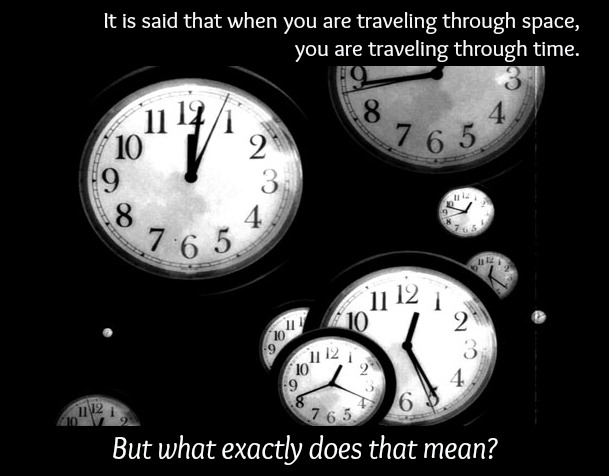
Question: Okay my question is in regards to the theory that if an object was to travel faster than the speed of light, that it would actually “travel back in time”. I have heard people try to explain this in a few different ways, but I never saw the logic in it… So basically I was wondering you guys could give the answer with a simple explanation? Asked By: Chris Palmer
Not-So-Simple Physics
I tend to think that the word “simple” paired with “physics” tends to be an oxymoron, but I’ll try to explain some various terms as simply as I can. First, to understand how this is possible, I must give you the cliff-notes of Einstein’s theories of special and general relativity. Follow me.

So, When Einstein first put together his theories, he concluded that space and time are one entity instead of two separate ones acting independently from the other. This is now called the space-time continuum. So, we also know that light travels at a speed that is almost perfectly constant across the vast expanse of mostly empty space. Since photons have no mass, they are able to travel at the universal speed limit, which measures out to be about 300,000 kilometers per second (or 186,000 miles per second). This is what we know as “the speed of light.” Literally, nothing (that we know of) can travel faster than this speed.
The Ties that Bind
Hopefully you’ve heard of Einstein’s famous equation E = mc^2, which revealed one of the most profound, life-changing discoveries of all time. You may know of it as the mass/energy equivalence. Essentially, matter is equal to energy (they are different expressions of the same thing). When something speeds up, its energy will increase too since energy is equal to mass (and vice versa). The heavier the object is, the more energy that is required to make it accelerate. Therefore, you would eventually need more and more energy to make the object continue moving at light-speed.

The most interesting portion of Einstein’s theory of special relativity probably has to be the implications of what happens to particles traveling near or at the speed of light. It says that time tends to go much slower for particles traveling at the speed of light than it would for an outside monitoring the photon’s progress from afar. Interestingly, this is one aspect of special relativity that can be tested here on Earth! Our satellites in LEO (low-Earth orbit) must take into account the effects of special relativity when calibrating their onboard clocks, which ticks with an accuracy of one nanosecond (about 1 billionth of a second).
Concept in Action
As an example, GPS satellites are capable of determining your exact position on Earth with an accuracy of 5 to 10 meters, but to achieve that level of precision, the clocks on board must be accurate to 20-30 nanoseconds. Because an observer on the ground (in your car in this instance) sees the satellite in space in motion relative to them, the clocks onboard will tick more slowly than the one in your car, causing them to be off by about 7 microseconds per day due to the time dilation effect of the relative motion of the two.

Still following? Okay. Assuming YOU were able to travel very close to the speed of light, you would experience time much more differently than someone observing your movement from Earth. Hypothetically, what you would experience as a second may feel like a minute to the observer, this is called time dilation. Theoretically, this could make you experience time backwards, which would violate causality (the chronological order of influence of things in the universe) not to mention how we perceive things from the floating rock we are chained to currently.
You’re probably wondering how this would work, but the details are kind of fuzzy to us too since most of the laws of physics point to this being very unlikely (if not impossible). If it were possible, as you approached light speed, the outside universe would begin to slow down in relation to you (or whatever else that’s traveling at the speed of light) before it stops. For you; that is. The observer will experience time the way they typically do. Once you exceed light speed, the outside world would slow down to the point that space/time would be moving backwards in relation to you.

Again, there is little evidence to suggest that faster than light travel is possible to begin with and that’s just for subatomic particles, which don’t have the mass that we (humans) do. If it were, there would be some incredibly awesome implications in the world of physics. One hypothesis postulates that it could be possible to communicate with the past using neutrinos, which famously invaded the news for a few months in 2011; after physicists thought they had evidence that suggested neutrinos were traveling just a bit faster than light speed. As it turns out, there were issues with the equipment and they didn’t actually observe neutrinos traveling faster than the universal speed limit. Even if we could, it’s quite unlikely the message would even be received since they don’t interact much with normal matter. It is kind of humbling to note that the past is very much a part of the universe as much as the present.